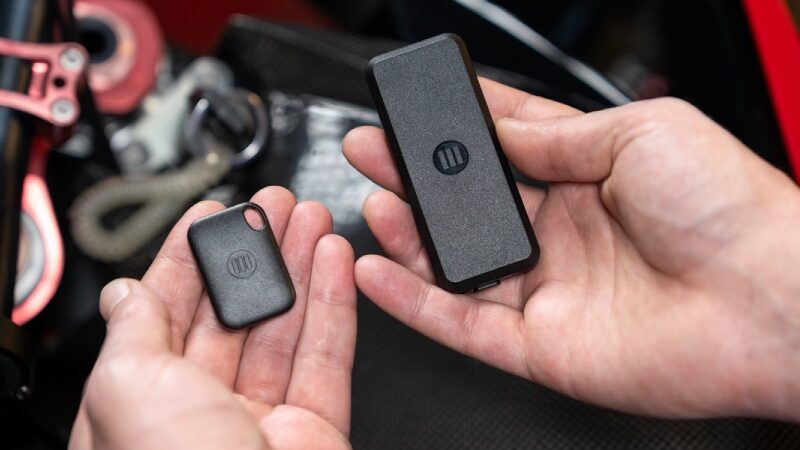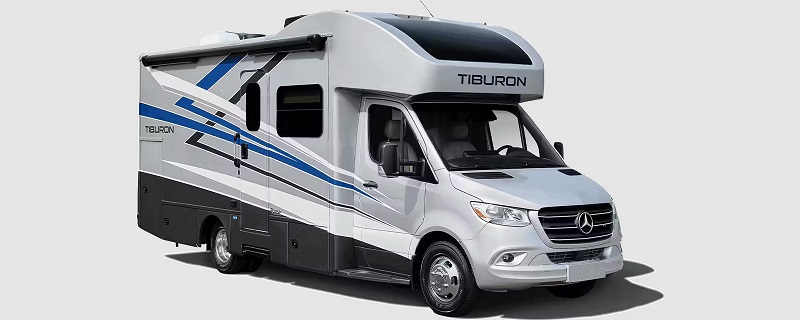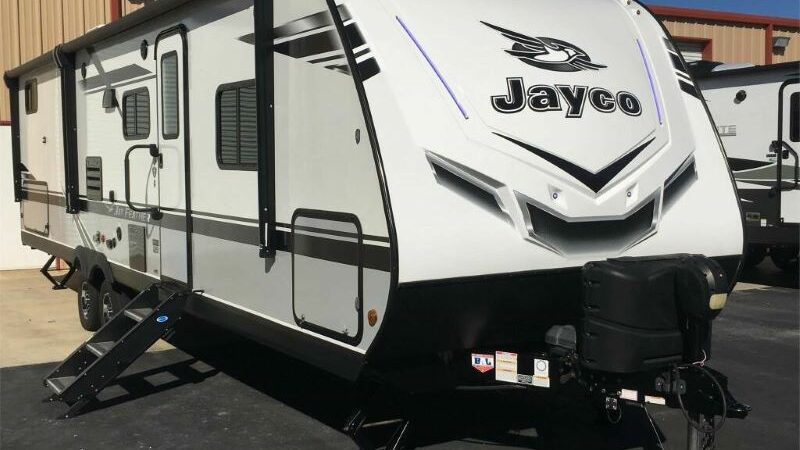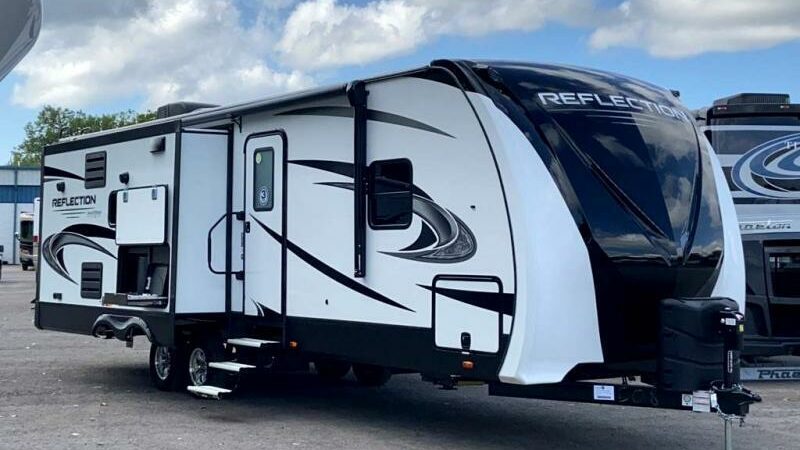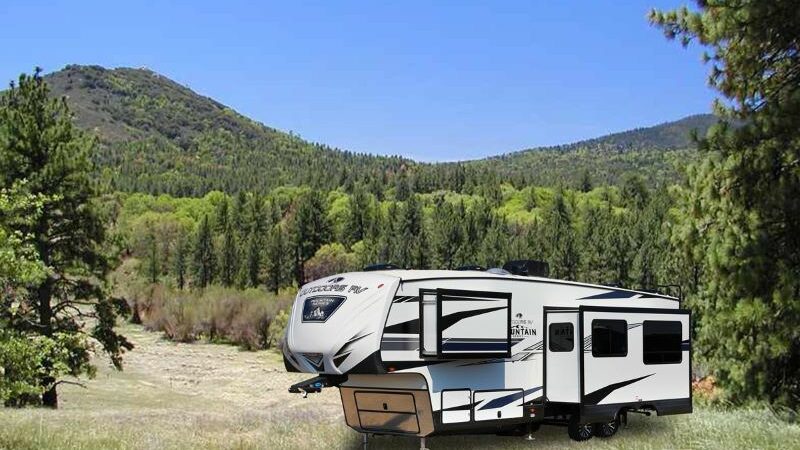Are Mercedes Chassis Motorhomes Worth It?
Thanks for your support! If you make a purchase using our links in this article, we may make a commission. And, as an Amazon Associate, I earn from qualifying purchases. See the full disclosure here.
Mercedes chassis motorhomes are well-known in RV circles. But, for newcomers, the word Mercedes is often associated with luxury and refinement well beyond the affordability of some.
With inflation, supply chain issues (especially in the microchip market), vehicle manufacturers prioritizing more premium models, reduced inventory, and the Federal Reserve raising interest rates, manufacturers are charging sky-high prices for even lower-tier vehicles.
Mercedes motorhomes remain on RVer’s radars, but current price trends force consumers to take a stance of tepid uncertainty. Is a Mercedes-Benz worth the cost, especially with higher auto loan rates? Well, we’re more than happy to provide the info, while taking the leap is entirely up to you.
Does Mercedes Make Motorhomes?
Mercedes-Benz doesn’t make motorhomes in their entirety. What they provide is the chassis and powertrain. The rest is up to the manufacturer, building up on the foundation of the provided chassis.
It’s like laying concrete before you build a deck or a home. Mercedes-Benz chassis are extremely popular, especially in the camper van category. But Mercedes also manufactures chassis for Class Cs, such as the Winnebago View 24D and the Tiffin Wayfarer 25LW.
While some manufacturers build from the chassis up, others, especially in the camper van category, take completed Mercedes Sprinters and convert them into RVs. This is part of the reason many of the Mercedes motorhomes on the market are so costly. You’re paying the RV business for the cost of the Sprinter van on top of the conversion cost.
It’s hard to argue with Mercedes powertrains as well. They score highly in terms of performance and longevity, another quality that drives up the overall popularity of these RVs.
Class Cs and Class B campervans are where it’s at for Mercedes and despite the rising costs, they remain popular amongst RVers and newbies to the RV lifestyle.
Speaking of overall costs, that leads us directly to our next topic.
How Much is a Motorhome with a Mercedes Chassis?
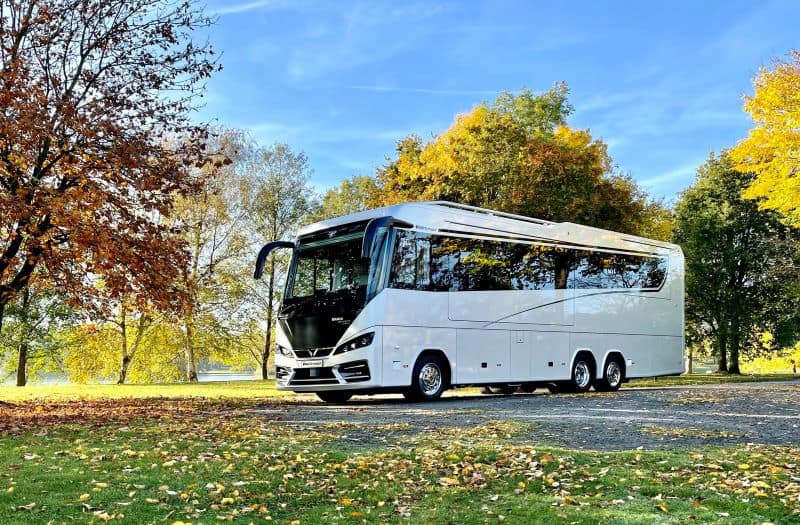
Mercedes motorhomes are pricey, although there is a huge disparity between certain RVs carrying the Mercedes name. In general, you’re looking at anywhere between $150k and a quarter million, brand new.
Obviously, there’s a fairly broad used market for these as well, especially considering the reliability of Mercedes powertrains and the overall builds. There are exceptions, such as the new Nelson Camper Van, built on the Mercedes chassis and powertrain, with an intro price of $400k!
The Nelson Camper Van is an Advanced RV product with an incredible interior and cedar aesthetic.
If you’re dying for a Class A version built on a Mercedes chassis, hold on to your seat. VARIO Mobil manufactures luxury Class As on a Mercedes Actros 2453 chassis and a 10.7-liter, turbo-diesel, six-cylinder engine.
A bottom-of-the-shelf VARIO Mobil will run you a cool million. Their latest edition of the VARIO Mobil Perfect retails for $1.7 million. If only the odds of winning the lottery were a little better. However, the Nelson Camper Van and the entire line of VARIO Mobil Class As are definitely exceptions to the rule.
We could give you a more detailed breakdown, but there are so many camper vans and Class Cs built on the Mercedes chassis that it would quickly turn into a small novel.
Suffice it to say, $150k is low-end and hard to find, with $180k the more accurate, starting price point for camper van options. Class Cs add another $50 to $100k.
Is Mercedes a Good Brand?
In general, Mercedes is an excellent brand, although everyone has their own opinions. Honestly, the Chevy vs. Ford argument will never go away and there are some who will swear off Mercedes, regardless of longevity and reliability specs.
However, it’s better to rely on consumer sentiment and reliability specs across the board. As with every auto manufacturer, there are bad years and good years. Any time you’re on the lookout for a new motorhome, you should look based on years.
According to the 2023 Kelly Blue Book, the Mercedes-Benz Sprinter scores an above-average rating for passenger quality, above-average overall quality, and above-average reliability. The final average scores are anywhere between 4.1 and 4.3 out of 5.0.
Mercedes motorhomes are not immune to recalls, however. In 2022, there were 4 recalls, and 14 the year before. The most recent recall included 9,000 Mercedes Sprinter vans, thanks to problems with the electric parking breaks in 2019 and 2020 on Mercedes Sprinters and Freightliner Sprinters.
Mercedes vehicles are products of German engineering, which includes the popular Volkswagen, Porsche, Audi, and BMW lines. According to university rankings internationally, the United States and Germany are highly ranked in terms of engineering.
Germany has a Global Innovation Index Rating of 10. So, you don’t have to worry about drop-off when buying Mercedes motorhomes. Plus, there’s always the fact that the Sprinter chassis is manufactured in South Carolina.
Are Mercedes Motorhomes Expensive to Maintain?
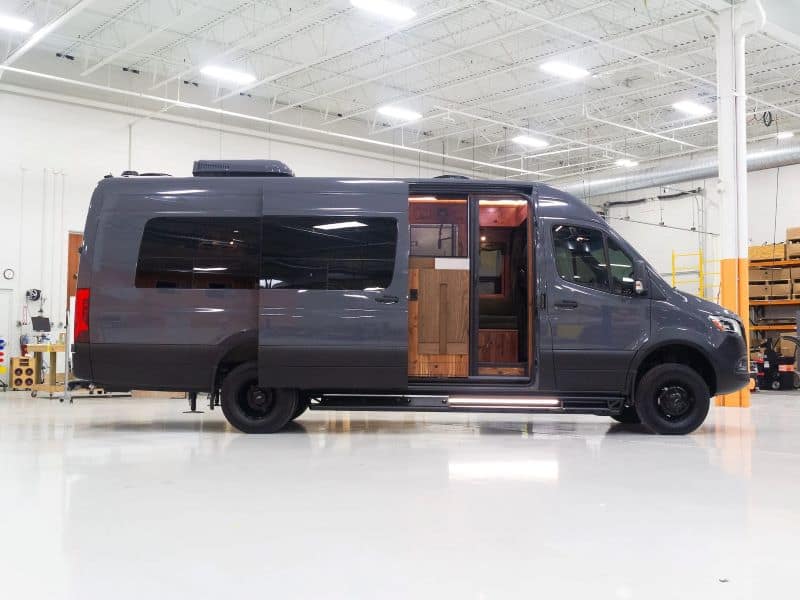
Only one brand outranks Mercedes in terms of expensive maintenance, and that’s BMW. According to Repair Pal, the 5-year maintenance cost of a Mercedes vehicle is $7,078, and that’s just a sedan. The costs go up for a Sprinter and, when you include diesel, the price goes up even more.
You’re dealing with a number of factors here. First, parts for a Mercedes are premium and more expensive than third-party counterparts or other vehicle brands.
Second, as a German-engineered product, oftentimes, only parts manufactured in Germany will do. That means shipping costs are included in there as well.
Third, brand recognition is a powerful thing when it comes to pricing.
Fourth, not all mechanics will work on foreign vehicles, narrowing your maintenance and repair options to those who are willing to charge a higher price, knowing your repair options are more limited.
Lastly, many Mercedes motorhomes are rocking diesel engines.
Diesel parts are often more expensive than their gasoline counterparts. If you purchase a Mercedes motorhome, you have to be willing to take the risk. Fortunately, you can minimize that risk through preventative maintenance.
- Go over your owner’s manual thoroughly for preventative maintenance procedures
- Schedule routine inspections, with a particular focus on the roof, electrical, and plumbing
- Check your fluids (oil, coolant, transmission, brake, etc.) and top them off when needed
- Routinely inspect the tires for cracks, loss of tread depth, and UV damage
- Test electrical and plumbing systems anytime you’ll be out of the RV for longer than two weeks
- Check and test generator operation
- Properly winterize your RV in the off-season
- Routinely check all appliances
Establishing a preventative maintenance checklist will transfer the labor to you and the costs back into your wallet.
Are Mercedes-Powered Motorhomes Worth It?
Whether Mercedes motorhomes are worth it is entirely subjective to most people. Which is completely understandable. We’ve all had our experiences with certain models and developed an intrinsic like or dislike for them.
Objectively, they’re worth it. They’re far more fuel efficient than Class A and larger Class C or Super C motorhomes. They have fewer faults right out of the shop, thanks to the simplicity necessary in smaller motorhomes.
Mercedes motorhomes also hold their value very well, mostly because of their reliability ratings and name recognition. The utility, customization, and functionality of a Mercedes motorhome (at least in the Sprinter van category), are nearly endless. They function very well when off the grid and are just as suitable for campground life.
Of course, if you don’t spend much time in your RV, it’s difficult to justify the expense. You only take advantage of the value of Mercedes motorhomes if you actively use them. As an occasional three-day or so vacation vehicle, not so much. If you choose one with a diesel engine, the value is even better.
Diesel engines eclipse gasoline in terms of longevity, reliability, and overall fuel mileage. Where 200,000 + miles is pushing the upper limits of a gasoline engine, you’re just halfway through the life cycle of a diesel.
3 Great Mercedes-Powered Motorhomes
1. Thor Delano 24RW
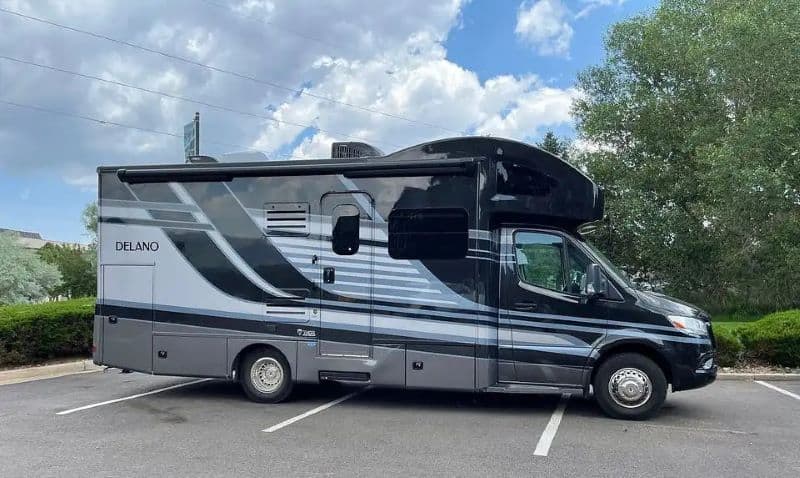
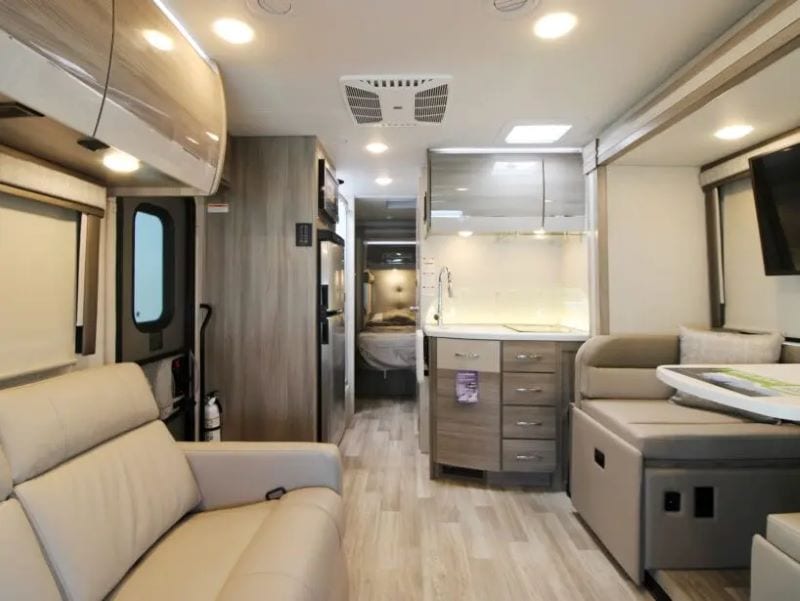
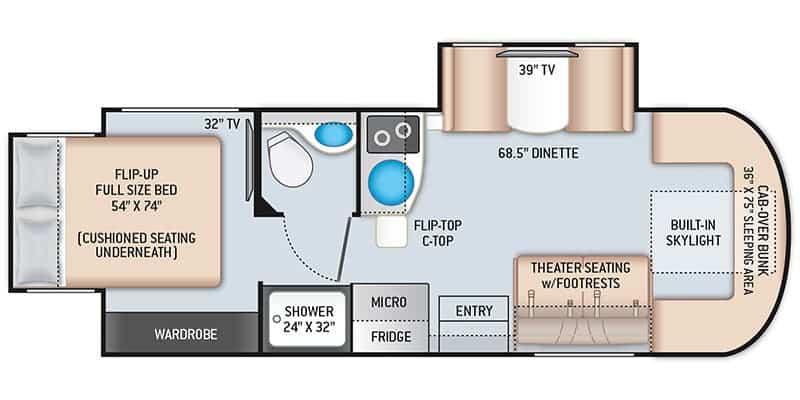
Our Pros and Cons
✅ Includes Winegard ConnecT 2.0
⛔ Interior colors are fairly sedentary
- Engine: 3.0L V6
- Length: 25′ 8”
- Chassis: Mercedes
- GVWR: 11,030 lbs
- Sleeps: 4
- Tow Capacity: 5,000 lbs
From the get-go, it’s clear that Thor’s focus (with the Delano) is on boondocking. Everything about the Delano screams off-grid.
One of the best features is the Winegard ConnecT 2.0, which includes a companion app. It serves as a Wi-Fi extender, accesses 4G, and acts as an FM antenna, all while tying into your smart devices on the RV.
It has a full wall slide-out and comes with exterior LP connectors and a hundred Watts of expandable solar on the roof. The 3.6kw generator will keep you going when unable to connect to 30-amp shore power.
The interior features a high-tech, washed gray aesthetic, which might appeal more to tech fans than others. You also have three floor plans to choose from, giving the RV a customizable feel.
2. Airstream Atlas
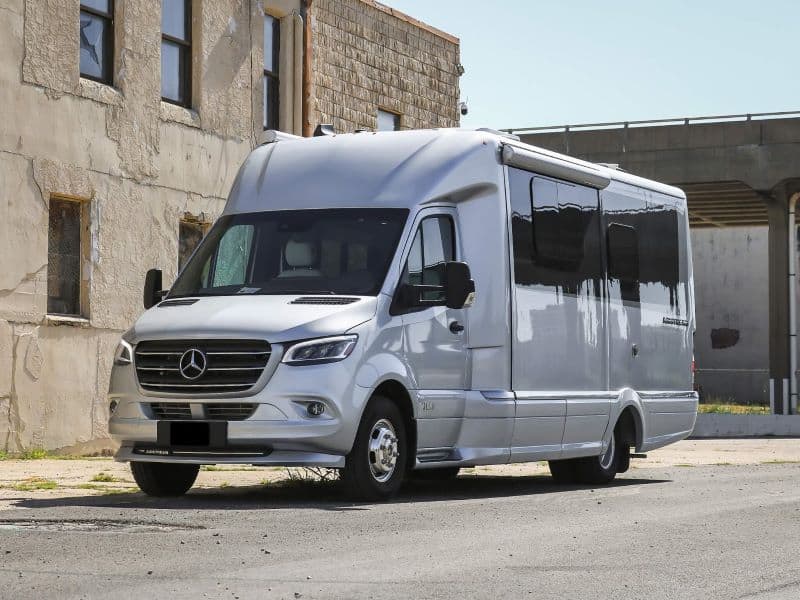
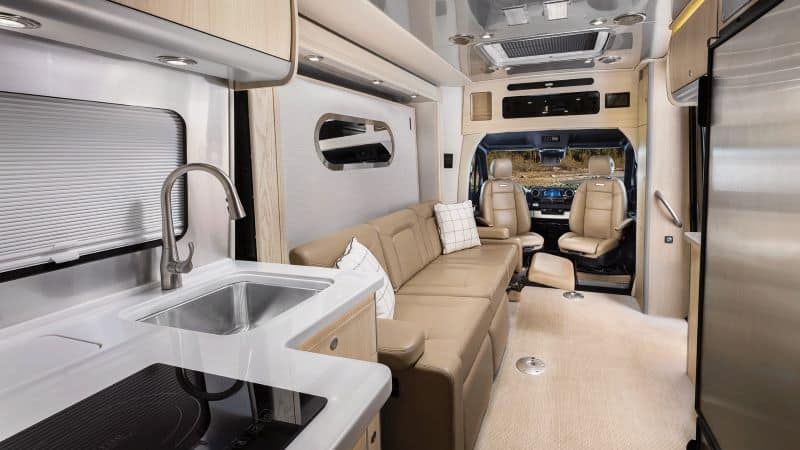
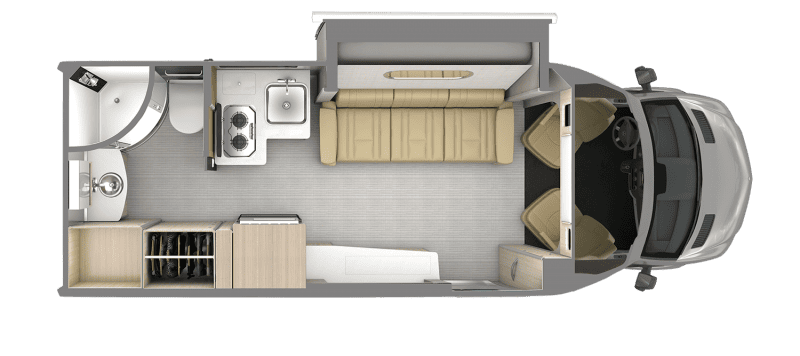
Our Pros and Cons
✅ Murphy bed Froli system works with slide-in or out
⛔ Only equipped with a small, two-burner cooktop
- Engine: 2.0L 4-Cylinder High Output Diesel
- Length: 24′
- Chassis: Mercedes-Sprinter 4500
- GVWR: 12,125 lbs
- Sleeps: 2
- Tow Capacity: 4,000 lbs
While Airstream is known for its rounded corners and aluminum, they are pretty good at building Mercedes motorhomes as well. The Atlas includes the traditional aluminum roof, and the interior sticks with that vibe, including magnetic catches and high-quality aesthetics.
Other than the roof, the exterior is a fiberglass shell, in line with the Scamp and Casita. This is a seamless build as well, which is interesting for a motorhome.
If you like Murphy beds, this one is built on a Froli system, and you can operate it even when the slide is in. A nice touch that makes extra space a matter of simple, folding logistics.
3. Tiffin Wayfarer 25TW
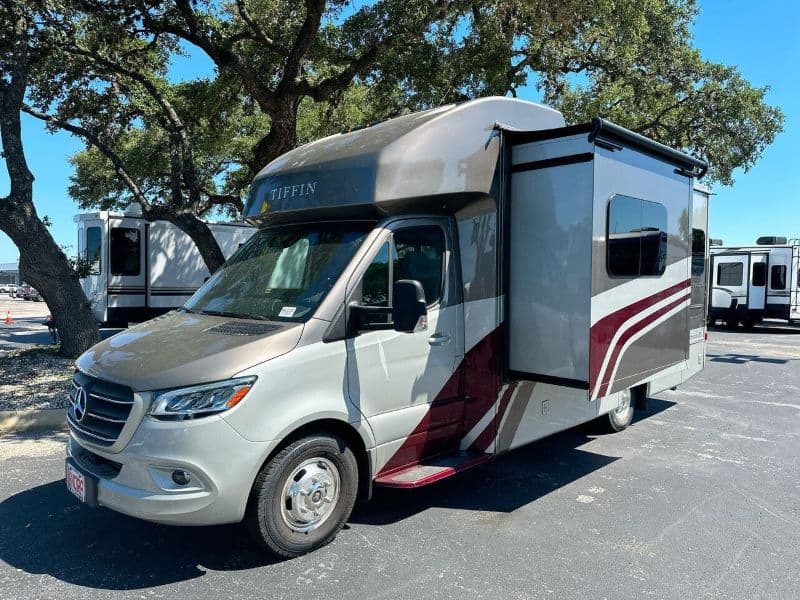
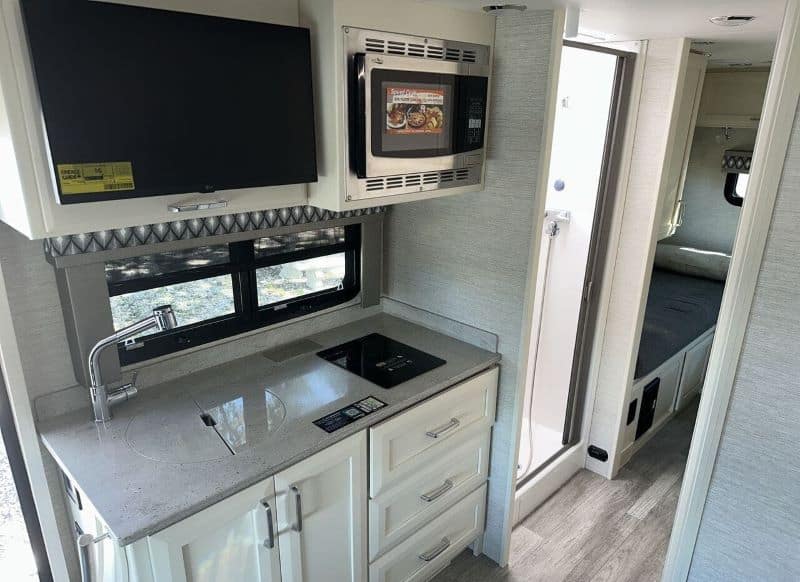
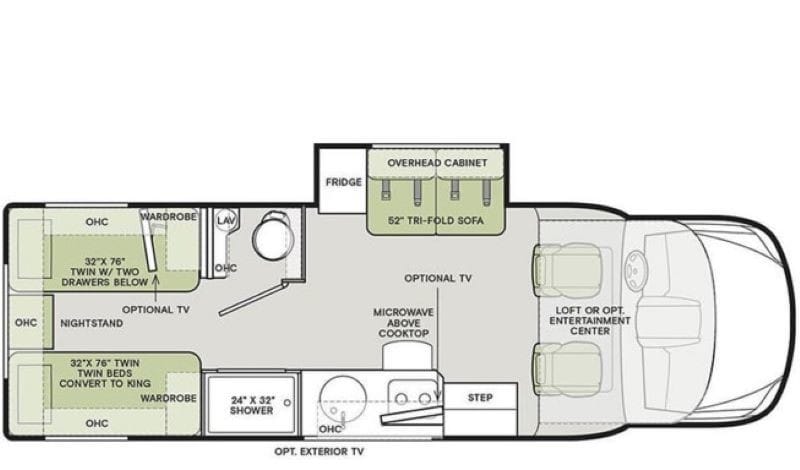
Our Pros and Cons
✅ The bathroom is huge for a motorhome this size
⛔ The only info on the cargo carrying capacity is that it’s 700 lbs, which is not much
- Engine: Mercedes V6
- Length: 25′ 6”
- Chassis: Mercedes Sprinter 3500
- GVWR: 11,030 lbs
- Sleeps: 6
- Tow Capacity: 5,000 lbs
Tiffin, like Airstream, has its own, automatic associations, usually with massive, luxurious Class A motorhomes. However, Tiffin takes it down a notch with the Wayfarer 25RW.
As an entry-level Class C, it’s a phenomenal rig that has a lot to offer other than the Mercedes chassis.
The interior feels immense, and you might think you’re in a Harry Potter movie, with an urge to step outside and try to visually associate the exterior with the interior. It stands to reason you can sleep 6 in this thing.
The powered Murphy bed adds even more space as well. If you have a medium-sized family or even a couple who appreciates space, this is an excellent choice.
Are Mercedes Motorhomes Better Than Ford?
First and foremost, let’s not go after the writer on this one. With that out of the way, the honest answer is that it depends. Not all RVs built on a Mercedes chassis are the same.
Not all RVs built on a Ford chassis are the same. Remember, we’re dealing with chassis and powertrains here, so our focus has to remain there, not on the rest of the motorhome.
For instance, the fact that the propane fridge decided to call it quits one week after purchase has zero to do with what chassis the fridge was sitting on. There’s little doubt that a Ford chassis, regardless of which one, set against a comparable Mercedes chassis, will be the cheaper of the two.
Not because it’s a Ford chassis but because of economic factors and brand associations. Ford is associated with tough, off-roading capabilities, while Mercedes is associated with luxury and bougie wine coolers. “Luxury” is always more expensive than “tough”.
If you like affordability, Ford is your choice. However, Mercedes historically has better resale value, so the two balance themselves out. The biggest separating factor between the two is the repair and maintenance costs.
Mercedes is undoubtedly more expensive in that arena. When it comes to Mercedes motorhomes, it’s often difficult to get the parts necessary for repairs as well.
What it really boils down to, and what everyone wants to argue about, is reliability. When it comes to camper vans, Transits are usually gasoline and Sprinters are usually diesel.
So, while the diesel wins the reliability category there, that’s less a matter of brand name and more a matter of modern engineering. We’ll leave it right there while it’s still safe to do so.
Final Thoughts About Mercedes Motorhomes
At the end of all this, we hope you have a more informed perspective on Mercedes motorhomes and whether it’s a good investment for you. While Mercedes Class Cs and Class Bs have had problems in the past, you can say that about every motorhome brand under the sun.
We do know that, in general, Mercedes is a reliable brand and always worth a second look. If you’re worried about repairs and maintenance, the more productive you are, in terms of preventative maintenance, the less of a worry repairs become.
All in all, there are a lot of excellent RVs built on the Mercedes chassis, and there’s a reason they are so popular.
If you see one that you like, and you plan on driving it on a ton of trips, taking full advantage of the value it offers, it will be a reliable and useful home on wheels for you.
Related Reading:
– 5 Best Class B RV Manufacturers
– Your Guide To The 5 Best Class B Plus Motorhomes
– 8 Best Class C Diesel Motorhomes
– Gas vs. Diesel RVs: Which Motorhome Is Best?
Thomas Godwin – Author and Part-Time RVer
Thomas Godwin is a full-time freelance writer with a BFA in Creative Writing, a U.S. Marine, and an avid outdoorsman.
Thomas’s love for RVing began at an early age spending time camping in the family vintage Airstream.
His background and education in writing, combined with his passion for the outdoors, can be seen in publications such as Camper Smarts and Vanlifers, as well as multiple animal and outdoor recreational publications.
When he’s not writing, he’s raising chickens and Appleyard ducks. Thomas also constructs teardrop campers (attempting to anyway) and kayaks the Blackwater River with his wife, two daughters, and his Dobermans.



